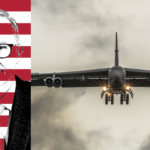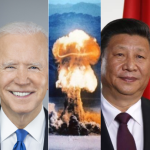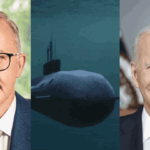The US Can Secretly Rotate Nuclear Warheads Through Australia

After a midmorning break on budget estimate proceedings, defence secretary Greg Moriarty delivered a response to a question put by Greens Senator Jordan Steele-John earlier in the day, which has since escalated the current debate over Australia relinquishing sovereignty to the US.
Steele-John quizzed Moriarty, on 15 February, as to whether B-52 bombers that will be “cycling through” the country, following the US Army having built storage space for six such fighters as part of its upgrade of RAAF Base Tindal, “will be solely conventionally capable, not nuclear capable”.
“It’s clear that stationing of nuclear weapons in Australia is prohibited by the South Pacific Nuclear Free Zone Treaty, to which Australia is fully committed,” advised Moriarty, adding that this treaty, nor that of non-proliferation, prevent foreign aircraft visiting or transiting local airfields or airspace.
According to the defence head, “successive Australian governments have understood and respected the longstanding US policy of neither confirming nor denying the presence of nuclear weapons on particular platforms”.
And the clear message coming from Moriarty, with the consensus of foreign affairs minister Penny Wong, is that for all Australia knows, the US could run nuclear warheads through the country, without informing anyone, and that’s what governments going back decades have agreed to.
Unimpeded access
When Steel-John further queried Moriarty as to whether this could see nuclear weapons transiting, Wong intervened stating that the question involves talk of “rotational forces under an agreement with another government”, so she’d like to provide an answer after the “opportunity to consult”.
The pre-prepared response later delivered by Moriarty included the admission that “US bomber aircraft have been visiting Australia since the early 1980s and have conducted training in Australia since 2005”. And over this time, Canberra has respected Washington’s policy of warhead ambiguity.
Moriarty added that this policy is in line with the 2014 Force Posture Agreement between the two nations, which provides the US with unimpeded access to certain local military facilities, of which it gains operational control over when it’s carrying out any construction activity at such a site.
The FPA officially established that US troops rotate through the north of Australia, with their number now having grown to 2,500 marines annually, as well as having improved interoperability between the nations’ air forces. And it’s this agreement that’s led to the construction of a B-52 storage site.
Washington’s proposed rotating of B-52s through the north is understood to be a threat to Beijing, and coupled with the broad US access to our military sites, as well as the joint facilities at Pine Gap and North West Cape, these arrangements likely hardwire us into any US war on China.
Ambiguity abounds
“As I understand from that, secretary, the government’s reading of Australia’s treaty obligations does not prohibit nuclear armed B-52s from being temporarily present in Australia,” Senator David Shoebridge suggested to Moriarty following his explanation of the opaque US stance on warheads.
However, at this point, Wong cut in on what appeared to be a fairly straightforward assessment coming from the Greens senator in regard to what the defence secretary had just explained.
“There’s no suggestion,” the foreign minister countered. “No one at this table has talked about nuclear armed B-52s.”
Wong then reiterated some of the points made by the defence secretary that clearly led to Shoebridge’s assumption: Canberra has long understood and respected “the longstanding US policy of neither confirming nor denying” and this doesn’t impinge on our international obligations.
Shoebridge then framed it in a different way, as he asked whether Defence considers this nation isn’t under any obligation to prevent nuclear armed US bombers from entering if they’re not a “permanent presence”. However, the minister, again, claimed he was “reading more into it”.
Then, after further reasonable prodding from the Greens member, Wong, quite tellingly, explained that she and the defence secretary weren’t in a position to go any further than the answer that was provided, and she then implied it was unfair to the community to posit further “hypotheticals”.
Gearing up for war
Whilst initial diplomatic moves made by Wong since taking over the foreign affairs portfolio have served a modicum of hope that the mounting tensions between Beijing and Canberra might be allayed, her December visit to the US saw this dashed.
Wong and defence minister Richard Marles were in Washington to meet with US secretary of state Antony Blinken and defence secretary Lloyd Austin late last year, as part of the annual AUSMIN conference, which had a focus on countering China’s “destabilising military activities” this time.
And the conference saw Austin extend an invitation to Japan – which is a part of the QUAD security arrangement, along with this country, the US and India – to join in the US Force Posture Initiatives, which are the operational arrangements established under the FPA, on Australian soil.
The resurrected QUAD has become of increasing importance with its new focus on Beijing. In fact, Anthony Albanese’s first act as prime minister was to fly to Japan for a QUAD meeting, while the following month saw him in Madrid for a NATO conference, which had China on its agenda.
And while the Albanese administration hasn’t repeated the hawkish ravings that former PM Scott Morrison and defence minister Peter Dutton were spouting at the end of their reign, the US presence in Australia, likely guarantees involvement in a war with China prior to any official decision.
Ending at the starting line
Following Wong’s explanation that all that could be said had been, Shoebridge put it to Moriarty that he understands that Australia doesn’t challenge the US on warhead ambiguity, and he then asked whether our treaty obligations aren’t breached by B-52s potentially carrying nuclear arsenal.
In response, the minister became even more ruffled than she had been prior, and she reiterated that the various treaties aren’t being threatened.
Wong then accused Shoebridge of drumming up concerns, to which he countered that he wasn’t “fearmongering” and put the question to the defence secretary one more time.
“I think the minister has outlined Australia’s treaty obligations,” Moriarty told the Greens senator, as he brought the exchange regarding B-52s to a close.
“As I said, under the South Pacific Nuclear Free Zone Treaty, to which we are fully committed, stationing of nuclear weapons is prohibited.”







